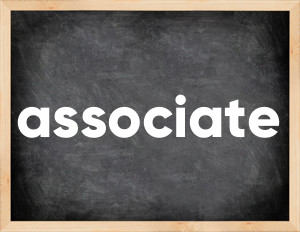 The English verb 'associate' is pronounced as [əˈsəʊʃieɪt].
The English verb 'associate' is pronounced as [əˈsəʊʃieɪt].
Related to:
regular verbs.
3 forms of verb associate: Infinitive (associate), Past Simple - (associated), Past Participle - (associated).
Here are the past tense forms of the verb associate
👉 Forms of verb associate in future and past simple and past participle.
❓ What is the past tense of associate.
Associate: Past, Present, and Participle Forms
| Base Form | Past Simple | Past Participle |
|---|---|---|
| associate [əˈsəʊʃieɪt] |
associated [əˈsəʊʃɪeɪtɪd] |
associated [əˈsəʊʃɪeɪtɪd] |
What are the 2nd and 3rd forms of the verb associate?
🎓 What are the past simple, future simple, present perfect, past perfect, and future perfect forms of the base form (infinitive) 'associate'?
Learn the three forms of the English verb 'associate'
- the first form (V1) is 'associate' used in present simple and future simple tenses.
- the second form (V2) is 'associated' used in past simple tense.
- the third form (V3) is 'associated' used in present perfect and past perfect tenses.
What are the past tense and past participle of associate?
The past tense and past participle of associate are: associate in past simple is associated, and past participle is associated.
What is the past tense of associate?
The past tense of the verb "associate" is "associated", and the past participle is "associated".
Verb Tenses
Past simple — associate in past simple associated
(V2).
Future simple — associate in future simple is associate (will + V1).
Present Perfect — associate in present perfect tense is
associated
(have/has + V3).
Past Perfect — associate in past perfect tense is
associated
(had + V3).
associate regular or irregular verb?
👉 Is 'associate' a regular or irregular verb? The verb 'associate' is regular verb.
Examples of Verb associate in Sentences
- This business will always be associated with your trip to China. (Future Simple)
- Previously, he was associated for me with Belgium (Past Simple)
- She associates herself with some very odd people. (Past Simple)
- I always associate the smell of coffee with my trip to Turkey. (Present Simple)
- Tell your story, Mary, and Ben will associate. (Future Simple)
- This way people will associate me with something bright. (Future Simple)
- We no longer wish to be associated with people like her. (Present Simple)
- I'm on probation, and I can't associate with my colleagues. (Present Simple)
- You know, we associate it with high-priced lawyers and bankers. (Present Simple)
- They will not associate with any other prisoners. (Future Simple)